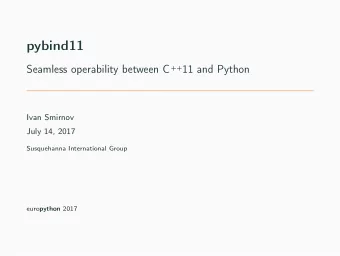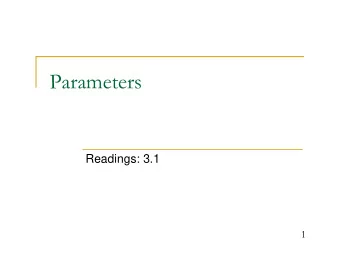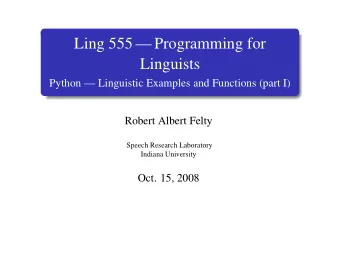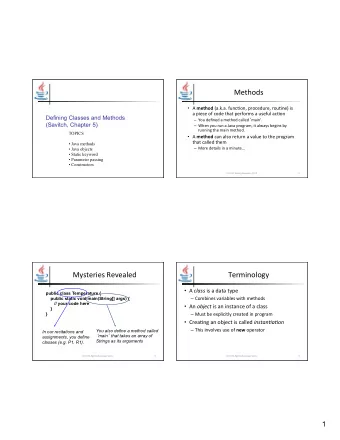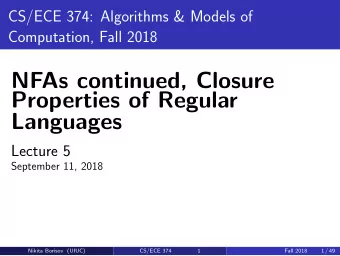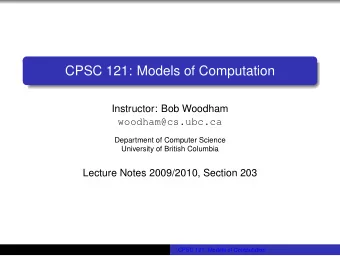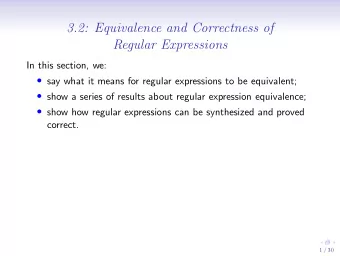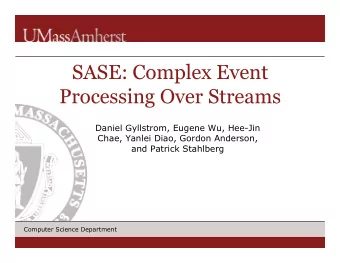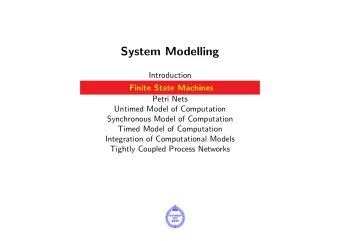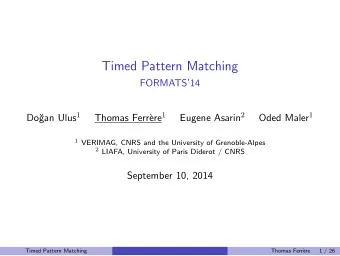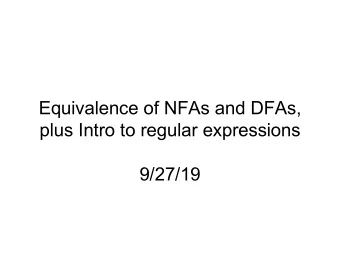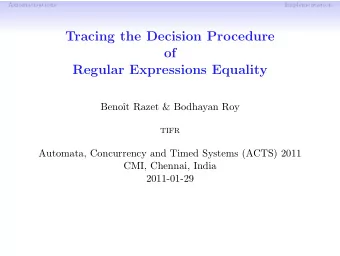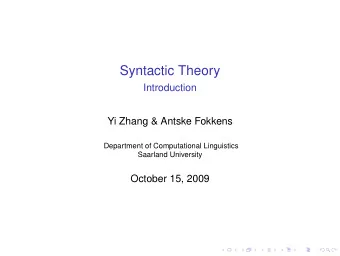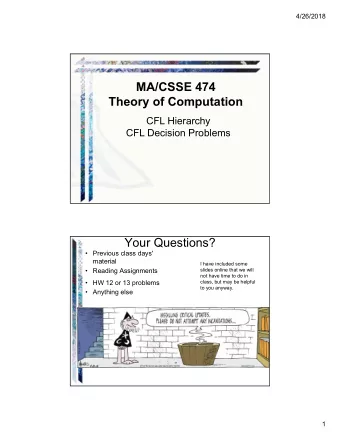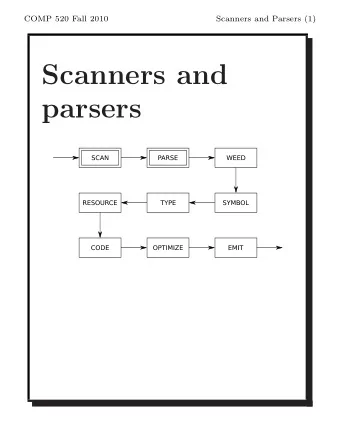
! ! e e ! s s e i i s c c i n n c o o n C C o - PowerPoint PPT Presentation
! ! e e ! s s e i i s c c i n n c o o n C C o C GNU Bash http://talk.jpnc.info/bash_linuxcon-eu.pdf http://talk.jpnc.info/bash_linuxcon-eu.pdf an introduction to advanced usage James Pannacciulli Systems Engineer in Web
! ! e e ! s s e i i s c c i n n c o o n C C o C GNU Bash http://talk.jpnc.info/bash_linuxcon-eu.pdf http://talk.jpnc.info/bash_linuxcon-eu.pdf an introduction to advanced usage James Pannacciulli Systems Engineer in Web Hosting
Notes about the presentation: ● This talk assumes you are familiar with basic command line concepts. ● This talk covers Bash , not the wealth of CLI utilities available on GNU/Linux and other systems. ● This talk assumes a GNU/Linux machine, though most everything here should be fairly portable. ● This talk is mostly compatible with Bash 3 , I'll try to note any examples which require Bash 4 . ● Bash is fantastic, enjoy the time you spend with it!
Command Types File: Keyword: External executable fjle. Reserved syntactic word. Builtin: Function: Command compiled in as User defjnable, named part of Bash. compound command. Alias: User defjnable, simple command substitution.
Getting Help with Bash and with your OS type: apropos: Determine type of command, Search man pages. list contents of aliases and man: functions. System manual. help: info: Display usage information about Advanced manual system Bash builtins and keywords. primarily used for GNU programs. General reference commands worth running: help info man bash help help man man info info man -a intro
Some Useful Definitions word Sequence of characters considered to be a single unit. list Sequence of one or more commands or pipelines . name A word consisting only of alphanumeric characters and underscores. Can not begin with a numeric character. parameter An entity that stores values . A variable is a parameter denoted by a name ; there are also positional and special parameters.
Return Status Success: Command should return a status of 0 . Failure: Command should return a non-zero status. ➢ Return values can range from 0 to 255 . ➢ The return value of the last command to have executed is captured in the special parameter $? . ➢ Many programs signal difgerent types of failure with difgerent return values.
Conditionals: if if list1; then list2; fi Evaluate list1 , then evaluate list2 only if list1 returns a status of 0 . if list1; then list2; else list3; fi Evaluate list1 , then evaluate list2 only if list1 returns a status of 0 . Otherwise, evaluate list3 . if list1; then list2; elif list3; then list4; else list5; fi Evaluate list1 , then evaluate list2 only if list1 returns a status of 0 . Otherwise, evaluate list3 , then evaluate list4 only if list3 returns a status of 0 . Otherwise, evaluate list5 .
Tests [ expression ] or test expression Evaluate conditional expression with the test builtin. [[ expression ]] Evaluate conditional expression with the [[ keyword; word splitting is not performed during any parameter expansion. The righthand side of a string comparison ( == , != ) is treated as a pattern when not quoted , and as a string when quoted . [[ -n string ]] string is non-empty [[ -z string ]] string is empty [[ string1 == " string2 " ]] string1 and string2 are the same [[ string1 != " string2 " ]] string1 and string2 are not the same [[ string == pattern ]] string matches pattern [[ string =~ regex ]] string matches regular expression [[ -e fjle ]] fjle exists [[ -f fjle ]] fjle is a regular fjle [[ -d fjle ]] fjle is a directory [[ -t fd ]] fd is open and refers to a terminal
Pattern Matching Pattern matching is used in Bash for the [[ and case keywords, pathname expansion , and some types of parameter expansion . * Matches any string, including null. ? Matches any single character. [character class] Matches any one of the characters enclosed between [ and ] . [^...] matches the complement (any character not in the class) [x-z] matches the range of characters from x to z [[: class :]] matches according to these POSIX classes: alnum alpha ascii blank cntrl digit graph lower print punct space
Conditionals: case case word in Match word against each pattern sequentially. pattern1) When the fjrst match is list1;; found, evaluate the list corresponding to that pattern2 | pattern3 ) match and stop matching. list2;; esac The | (pipe) character between two patterns entails a match if either pattern matches (OR).
Parameters Positional Parameters: $1 $2 $3 $4 $5 $6 $7 $8 $9 ${10} ... Parameters passed to salient command, encapsulating words on the command line as arguments . Special Parameters: $* $@ $# $- $$ $0 $! $? $_ Parameters providing information about positional parameters, the current shell, and the previous command. Variables: name = string Parameters which may be assigned values by the user. There are also some special shell variables which may provide information, toggle shell options, or confjgure certain features. For variable assignment, “ = ” must not have adjacent spaces.
Parameter Expansion: Conditionals (check if variable is unset, empty, or non-empty) unset param param= ”” param=” gnu ” – gnu ${param - default } default ${param = default } name = default – gnu ${param + alternate } alternate alternate – ${param ? error } – gnu error Treat empty as unset: default gnu ${param :- default } default ${param := default } name = default gnu name = defaul t ${param :+ alternate } – alternate – error gnu ${param :? error } error
Parameter Expansion: Substrings param=” racecar ” ofgset of 3 , length of 2 Extraction: ecar ${param : ofgset } ec ${param : ofgset : length } Removal from left edge: pattern is ' *c ' ecar ${param # pattern } ar ${param ## pattern } Removal from right edge: pattern is ' c* ' race ${param % pattern } ra ${param %% pattern }
Parameter Expansion: Pattern Substitution param=” racecar ” Substitution: pattern is ' c? ', string is ' T ' ${param / pattern / string } ra T car ${param // pattern / string } ra TT r Substitute at left edge: pattern is ' r ', string is ' T ' ${param /# pattern / string } T acecar Substitute at right edge: ${param /% pattern / string } raceca T
Parameter Expansion: Indirection, Listing, and Length param=” parade ”; parade=” long ”; name=( gnu not unix ) Indirect expansion: long ${ ! param} List names matching prefix “ pa ”: parade param ${ ! pa*} or “${ ! pa@}” List keys in array: 0 1 2 ${ ! name[*]} or “${ ! name[@]}” Expand to length: 6 ${ # param}
Indexed Arrays Assign an array by elements: array =( zero one two "three and more" ) Add an element to an array: array +=( "four and beyond" ) Recreate array with spaces in elements as underscores: array =( "${array[@] // /_ }" ) Recreate array only with elements from index 2 to 4: array =( "${array[@] :2:3 }" ) Print element at index 1 of array (second element): echo "${array [1] }" Associative arrays are Print array indexes: available in Bash 4 and greater. echo ${ ! array [@] }
Arithmetic Expressions (( math and stuff )) name++ increment name after evaluation name-- decrement name after evaluation ++name increment name before evaluation --name decrement name before evaluation - + * / % ** <= >= < > == != && || ➢ Can be used as a test, returning 0 if the comparison, equality, or inequality is true, or if the calculated number is not zero. ➢ Can provide in-line expansion when used like command substitution – $(( math )). ➢ Bash does not natively support fmoating point.
Brace Expansion Arbitrary Word Generation String generation: Bash can complete a list of fjles prefjx { ab , cd , ef } suffjx into nested brace expansion format with the ESC-{ key Sequence generation: combination. All key bindings may be displayed with bind -P. prefjx { x .. y } suffjx Sequencing by specified increment (Bash 4+): prefjx { x .. y .. incr } suffjx Brace expansion may be The prefj fjx and suffj ffjx nested and combined. are optional.
Compound Commands Iteration: Continuously loop over list of commands delineated by the keywords do and done . while until for select Conditionals: Execute list of commands only if certain conditions are met. if case Command groups: Grouped list of commands, sharing any external redirections and whose return value is that of the list . (list) { list; }
While and Until Loops (Typically) iterate based on an external resource while list1; do list2; done Execute list1 ; if success , execute list2 and repeat. Continue until list1 returns a non-zero status ( fails ). until list1; do list2; done Execute list1 ; if failure , execute list2 and repeat. Continue until list1 returns a status of 0 ( succeeds ). The following construct is incredibly handy for processing lines of text: while read
Recommend
More recommend
Explore More Topics
Stay informed with curated content and fresh updates.

